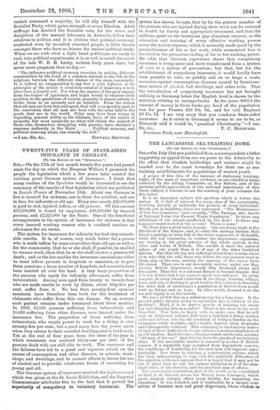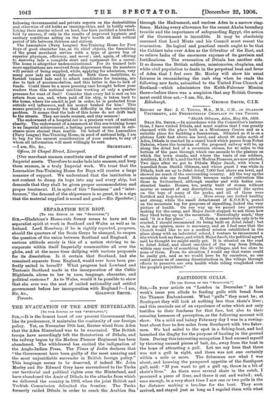THE LANCASHIRE SEA-TRAINING HOME.
[To THE ED1TOIL OP TOE "SPECTATOR.")
Sut,—On July 21st you published from a correspondent a letter suggesting an appeal from our sea-ports to the Admiralty to the effect that obsolete battleships and cruisers might be handed over to the coast townships for their use as sea- training establishments for populations of wastrel youth.
A propos of this idea of the increase of stationary training- hulks, of the mass of important evidence on sea education being collected by the sitting Committee on Boy Sailors, and of the growing public appreciation of the national importance of this whole subject, I venture to ask the courtesy of your columns for this letter.
It is no dryasdust subject this problem which is before the nation. It is full of interest for every class of the community, touching directly or indirectly the pockets of every individual. Briefly put in headlines, there are concerned : " The Maintenance of Our Sea Commerce," and, secondly, " The Turning into Assets of National Value Our Present Waste Population." Is there any inhabitant of our islands unaffected by the first ? Is there any taxpayer uninterested in the second ? There is none !
We have here a need and a remedy. Our sea-borne trade is the life-blood of the Empire, and, to carry the analogy further, that blood is pulsing in veins full of the white corpuscles of ill-health, while the red corpuscles, to combat the degenerate organisms, are wasting in the great arteries of the whole system, in the cities and towns of Britain. The sea-life is more the natural sphere of our youth than it is of any of the other land-tied nations. But that life has not sufficient attractions to make those of us who obey the call, those who follow the sea-instinct bred in them, stay on the seas, making the mastery of the waves their life career. There are in our mercantile marine, under our flag, serving British shipowners, nearly fifty thousand aliens and foreigners. That this is a national danger is beyond dispute. But it is not of this that I ask leave to speak here and now. In every sea-port, in every inland collection of dwellings, forming village, town, and city, is floating (a good word in this connexion, denoting the utter lack of anchorage) a population of British-born youth with no future and no hope. In other words, demand is on the sea and supply is on the streets.
We have all felt this in a nebulous way for a long time. Is the present public interest going to crystallise into a solution of the problem ? Mind, it is no matter merely of training the street boy and shipping him as a sailor ! There is far more in the work than that. You have, to begin with, to make sure that he will stay on shipboard and not drift back a half-baked thing, neither sailor nor lubber, into his old condition of being a burden on the ratepayers while destitute, and a double burden when desperate and consequently criminal. This returning to land-misery makes of each of these individuals, to our citizens, a modern adaptation of an old incubus. Each becomes, clinging round our throats, a young "old man of the sea." And this has been the puzzle of sea-training ships. If the mercantile marine is manned by a class of British seamen of a reputable type recruited from dependable sources, the conditions of board-ship life for such men will improve auto- matically. Now there is existing a constructive scheme which has been endeavouring to cope with the multifold difficulties of the question, with such success that it is hoped that it may not be out of place here to call the earnest attention to it of the arm- chair critic, of the theorist, and the practical man of affairs.
The sea-training institution, first in the world to be established on land, is at Liscard, across tho Mersey from Liverpool, which great sea-port estuary offers every facility for imparting sea education. It was founded, and is conducted, by a unique com- mittee of business men and great shipowners, whose wisdom is
following Governmental and private reports on the desirabilities and otherwise of old hulks as training-ships, and in boldly estab- lishing their marine school on land, has been justified a hundred- fold by success, if only in the results of improved hygienic and sanitary conditions acting on the boy's health at that critical period of life between thirteen and sixteen.
The Lancashire (Navy League) Sea-Training Home for Poor Boys of good character has, as its chief objects, the furnishing of the great merchant service with a type of grown boy of superior physique, efficiency, and moral ; and, again, of offering to deserving lads a complete start and equipment for a career. The home is altogether undenominational. For its trained lads more applications are received from shipowners than its numbers will permit of being supplied, while, applying for admission, very many poor lads are weekly refused. Both these inabilities, to furnish trained lads and to admit candidates for training, are due to lack of accommodation, and this latter is due to lack of funds. Could there be a more pressing case brought before your readers than this national machine working at only a quarter pressure for want of fuel? Consider that every lad is met on his return from sea, and, when paid off his ship, is taken back to the home, where his sea-kit is put in order, he is protected from outside evil influences, and his money banked for him ! This means precisely a remedy for that difficulty in the sea-training problem. It means that the lads of this home do not drift back to the streets. They are made seamen, and stay seamen !
The endowment of a hospital cot is a precious work of national charity. The endowment of a hammock at this sea-training home is an Imperial achievement, a lasting personal memorial in sub- stance more eternal than marble. On behalf of the Lancashire (Navy League) Sea-Training Home, in need of national help, I am to beg for the earnest consideration of your readers, to any of whom all information will most willingly be sent.
—I am, Sir, &c., SECRETARY. Offices, 28 Chapel Street, Liverpool.
[Our merchant seamen constitute one of the greatest of our Imperial assets. Therefore to make lads into seamen, and keep them seamen, is a truly Imperial work. We trust that the Lancashire Sea-Training Home for Boys will receive a large measure of support. We understand that the institution is not content to dump its boys into any and every ship, but demands that they shall be given proper accommodation and proper treatment. If, in spite of this " fussiness " and " inter- ference," the demand of the shipowners is so great, it is a sign that the material supplied is sound and good.—ED. Spectator.]







































 Previous page
Previous page